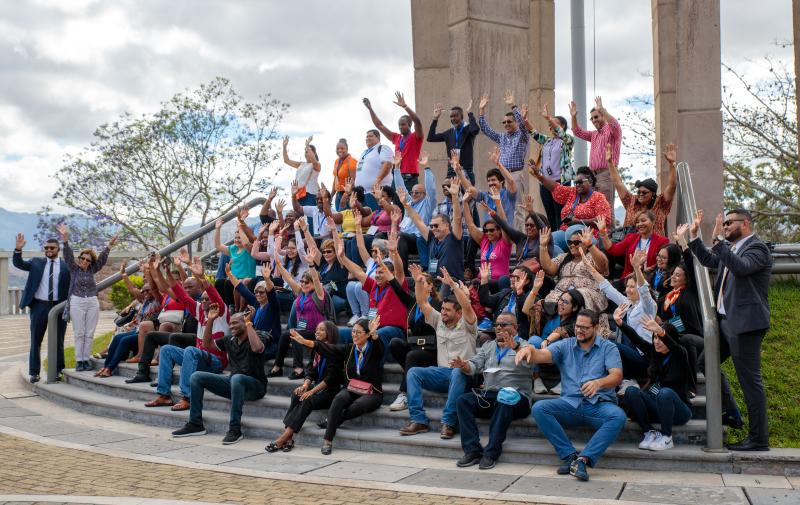
The Latin American and Caribbean region has managed to make significant progress in education in recent years, but a large number of challenges still persist throughout the region, where, according to World Bank and UNICEF data (https://www.bancomundial.org/es/news/press-release/2022/06/23/education-latin-america), there are still 15 million children and adolescents outside the educational system.
Therefore, the objective 3rd KIX LAC Regional Meeting was to continue advancing in the mobilization of evidence, knowledge, innovations and to promote the exchange of experiences on educational policies and practices: “Strengthening Public Education in Latin America and the Caribbean”, where, for the first time in person, over 60 professionals in the field of education met (representatives of the Ministries of Education, universities, teacher unions, civil society organizations and international experts) in the city of Tegucigalpa, Honduras.
The importance of evidence
One of the main objectives of the KIX LAC hub - Knowledge and Innovation Exchange for Latin America and the Caribbean -, an initiative led by SUMMA and the OECS, with the support of the Global Partnership for Education (GPE) and the International Development Research Centre (IDRC), has been to identify the educational gaps and priorities existing in the countries in order to build a policy and research agenda that focuses on the issues that require the mobilization of evidence.
Precisely, the program’s work over the past three years has made it possible to analyze both particular and regional contexts, thus promoting approach strategies in order to face the obstacles produced by the COVID-19 pandemic. As a result, diagnostic reports have been prepared on the educational priorities of 8 countries, and round tables were established to discuss and validate these results; there have been 14 KIX Conversations, 6 webinars, 2 international conferences, 2 research discussions, 4 visits to Barbados, Honduras, El Salvador and Saint Lucia, 3 annual regional meetings, 4 workshops, 4 initiatives were implemented, recognized by the LAB-ED project, a Community of Practice on Gender Perspective in Public Education was created and developed, a technical learning visit was held in Chile with participants from El Salvador and the Edudata educational data platform was launched.
Along these same lines, the regional meeting allowed not only to showcase these results, but also to offer the perfect environment to discuss and share the current educational challenges that continue to be present in the region.
The presentation of the regional study, «La Voz Docente» (https://www.summaedu.org/iniciativas-destacadas/proyecto/encuesta-la-voz-docente/), carried out by SUMMA together with OECS in 21 countries of Latin America and the Caribbean, and which involved the participation of nearly 200,000 teachers (2022), allowed opening the discussion and listing the negative impacts of the pandemic: deterioration of teacher and student well-being, the need to recover learning caused by the closure of schools, the need to strengthen support mechanisms and pedagogical accompaniment; the need for investment in infrastructure and technology, the need for financing, and the efficient use of resources. Additionally, 64.8% of teachers reported a decrease in their students’ attendance and 56.7% even identified a real risk of educational exclusion.
Regional voices and government perspective
The Central American countries share similar social, economic and educational contexts, and during the meeting, they sought to reflect on the opportunities for articulation and creation of alliances between countries accompanied by the KIX LAC hub, to allow transcending contexts and presidential terms. The countries agreed that efforts for the next four years of KIX 2.0 should seek to:
- Recover learning and find strategies that ensure the socio-emotional well-being of children, adolescents and teachers.
- Place educational recovery at the top of the public agenda.
- Review and build educational content consistent with the new social paradigms, based on gender equality and equal opportunities.
- Acknowledge teachers’ work and support continuous teacher professional development.
In this sense, and with the purpose of showcasing and exchanging solid experiences on project and initiative implementation within the KIX Ecosystem that address various educational priorities in the region, researchers, authorities and professors from various organizations had the opportunity to present the projects they are carrying out and share their experiences and challenges both in terms of project planning and implementation within the territory. These initiatives are part of the global program that GPE KIX carries out, which supports the creation and implementation of projects that generate actionable evidence so that low- and middle-income countries can work on the main challenges in their education systems.
The following projects, implemented by NGOs that are part of the KIX Ecosystem in Latin America and the Caribbean, are focused on working on prevention strategies against gender violence, remote education, rural education and teacher training, and during the meeting, they had the opportunity to present their progress and the results achieved so far:
Educación 2020: Adapting and scaling peer mentoring for teachers and school leaders for equitable rural education
CLADE Network: Strategies to prevent sexual and gender violence and to promote equity in rural schools
Fundación Ceibal: Digital adaptations for effective and inclusive distance education in rural communities in Honduras and Nicaragua
Université d'État d'Haïti (Limonade) and Raise Your Voice ST. Lucia: Strengthening Teachers and School Principals' Capacity for Scaling Innovation from the Bottom Up in the Education System in the Caribbean
